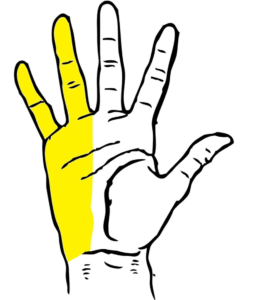Cubital Tunnel Syndrome

Cubital Tunnel Syndrome is caused by compression of the ulnar nerve at the elbow and leads to numbness in the ring and small fingers. The nerve also provides important innervation to muscles in the hand and the forearm (grip and pinch). Like carpal tunnel syndrome, continued compression will cause permanent numbness and loss of function of the hand. However unlike carpal tunnel, this nerve takes a longer time to recover. Therefore it is important to address signs of cubital tunnel early before permanent damage takes place.
Symptoms typically occur with the elbow bent, which causes the nerve to stretch/tunnel to compress. Patients often complain about driving or talking on the phone for extended periods of time. They may also notice that their grip becomes weaker and have trouble with opening jars or holding objects.
Diagnosis of Cubital Tunnel Syndrome
History and physical exam help with the diagnosis of cubital tunnel syndrome. An EMG can help quantify how your nerve/muscles are functioning. It can also determine if you are having other points of compressions such as in your neck.
Treatment Options for Cubital Tunnel Syndrome
Non-Operative
Prevention is key and preventing the compression/stretch that occurs with bending the elbow is the mainstay of treatment. This can easily be accomplished at night by wrapping a towel around the arm or wearing a splint. During the day, avoid leaning on the elbow and take breaks. Non operative treatment has been shown to be effective in over 75% of patients with mild symptoms.
Operative
When conservative treatment fails surgery is recommended before permanent nerve damage sets in. Surgery is performed on the inside of the elbow with the cubital tunnel being released. In some patients the ulnar nerve moves in and out of the groove with bending of the elbow. This may be addressed at the time of surgery with moving (transpositioning) the nerve.
Expectations/Outcomes with Cubital Tunnel Syndrome
Cubital tunnel recovery takes longer than carpal tunnel recovery. Nerve typically heals at 1 mm per day. From the elbow to the fingers it may take months to notice improvements especially in patients who have severe symptoms or chronic numbness . Studies have shown that people have had improvement years after surgery.
Learn More Here
